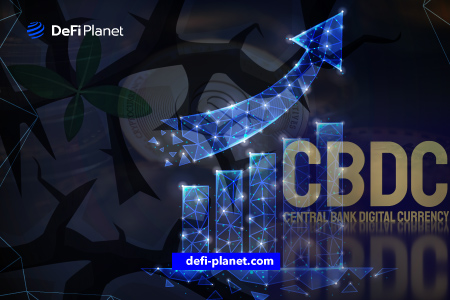Last updated on November 17th, 2022 at 01:08 pm
Central Bank Digital Currencies (CBDCs) have been defined as a currency and payment structure that will bank the unbanked members of society and promote financial inclusivity.
There are various reasons why a particular segment of society may be unable to use the traditional banking structure. This can range from an apparent lack of trust in the system to a lack of the criteria required to gain access to the average banking structure.
Banks are nonexistent in some rural areas, and the average person may have to travel for several hours before they can access an ATM or even a bank branch.
Regardless of the reasons for the exclusion of a certain percentage of the public from banking facilities, proponents of CBDC claim that this technology will provide access to payment infrastructure to the unbanked population.
This implies that CBDCs are intended to address the issues that make access to banking infrastructure difficult for the unbanked population.
Another school of thought believes that stablecoins, rather than CBDCs, have a better chance of reducing financial exclusion.
This article examines the definition of CBDCs and considers whether they can truly combat financial exclusion more effectively than stablecoins.
A stablecoin is a type of cryptocurrency designed to mimic the characteristics of fiat currency. This type of coin is pegged to the value of a fiat currency, such as the US dollar.
With the volatility of the crypto space, stablecoins, as the name implies, are designed to remain stable or hold value over time. Holders of this type of token do not have to worry about volatility, regardless of the state of the crypto market.
Whether or not the general state of the market is favorable to cryptocurrency prices, the value of a stablecoin remains constant.
In a bear market, when the values of cryptocurrencies such as Bitcoin, Ether, AVAX, and so on plummet, stablecoin holders can be confident that the value of their stablecoin holdings will remain constant. The same thing happens during a bull market.
What is a CBDC?
A Central Bank Digital Currency (CBDC) is a digital version of a fiat currency. A government issues it to represent the digital token of its country’s official currency.
This type of virtual token differs from cryptocurrencies in that it is issued and regulated by the government and may not be as transparent. CBDCs may also make financial privacy difficult to obtain.
Various governments may use CBDCs to influence their economic policies. Residents of a country would trust a government-issued token because it is issued by the authorities, just like cash.
Several countries are developing CBDCs, but only a few have released a working prototype.
CBDCs may be retail or wholesale variants. For the retail CBDCs, it allows the central bank to transfer the currency directly to the citizens without the need to use commercial banks as intermediaries.
Wholesale CBDCs are based on the usual interbank transaction channels of commercial banks. It would involve the transfer of digital currency between multiple banks.
A theoretical benefit of CBDCs is to improve financial inclusion. According to reports, “Retail CBDCs have the potential to deal with the problem of access to financial institutions, by making them more accessible than they currently are. Retail CBDCs are issued by a central bank directly to people without going through the traditional bank accounts where you might need to physically go to open the bank account. In this system, individuals will have CBDC accounts directly on the main central bank ledger, accessible via a wallet (which may or may be private or public sector operated). After which they have access to the money in these accounts.”
CBDCs are legal tender because they are issued by the government. People prefer to accept legal tender over currency issued by a private individual because they have more faith in the former. CBDC, as an offshoot of traditional fiat currencies, benefits from this feature by definition.
This can also be a disadvantage for those who want to limit their interaction with the government because they lack trust in the current governance structure.
CBDCs are thought to promote financial inclusion. Is this true, or is it just a benefit that exists in a hypothetical world? To illustrate, we examine as a case study, the CBDC issued by the Central Bank of Nigeria, known as the e-Naira.
e-Naira
The e-Naira is a CBDC issued by the Central Bank of Nigeria, and it is the digital representation of the fiat currency called the naira. Nigeria is one of the first countries to launch an operational CBDC.
“The main purpose of the eNaira is to improve financial inclusion for the unbanked members of society. Anyone can open an eNaira account, as long as they have a Nigerian Bank Verification Number (BVN). A BVN can be set up without necessarily having a bank account.”
In theory, the proposed benefits of the e-Naira include:
- The creation of an efficient payment channel.
- Improved cross-border payment.
- A more efficient tax remittance process.
- Targeted social interventions.
As previously stated, the average Nigerian must have a BVN to open an e-Naira account.
The BVN is a form of identification issued by commercial banks in Nigeria. This means that anyone who wishes to use the e-Naira must first visit a bank and request a BVN. Before issuing a BVN, the bank may request that the individual open an account.
This defeats the purpose of financial inclusion, especially since the unbanked population must still rely on the banking structure in order to use the e-Naira.
One step that e-Naira issuers took to improve inclusivity was to add multiple ways to access the service. According to the e-Naira website,
- Customers will be able to access eNaira via the eNaira wallet in app stores such as the Google Play store and the Apple App store.
- Users can also perform transactions by dialing a USSD short code and following the instructions.
This could be a step toward inclusivity, especially for those without internet access. However, the requirement that individuals visit a bank to register for a BVN may negate it. The structure of a CBDC is determined by whether or not it will truly drive financial inclusion better than stablecoin.
Why Are Stablecoins Better Than CBDCs In Promoting Financial Inclusion?
Stablecoins are created by private organizations and are not backed by the government, so they are not legal tender. Though many stablecoins are governed by centralized bodies, they still provide some level of transaction decentralization.
Unbanked people may not trust the traditional financial system, of which the CBDC is an offshoot because it is controlled by the government, is difficult to access, or is not user-friendly.
As previously stated, CBDCs such as the e-Naira require prospective users to go through a rigorous Know Your Customer process, which includes adding an identification number such as the Bank Verification Number (BVN).
In Nigeria, for example, users must submit their BVN before they can access the architecture. In Nigeria, the only way to obtain a BVN is to apply for it at a bank. This essentially defeats the purpose of banking for the unbanked, as residents must still visit a bank before they can use the e-Naira.
The following are some reasons why stablecoins outperform CBDCs in terms of financial inclusion.
Freedom from government interference
Stablecoins are issued by private entities, which means that government oversight is limited in this area, especially if the stablecoin is decentralized.
For centralized stablecoin, the government can still request that stablecoin issuers blacklist certain wallet addresses. Tether, for example, has been known to freeze some wallet addresses associated with the stablecoin USDT.
“When a Kucoin hack occurred in 2020, Tether blacklisted over $35 million USDT, which stopped the hackers from benefiting from the loot. Another reason that Tether has given for blacklisting addresses in the past is a precautionary reason, where they are frozen because the addresses have been associated with a scam.”
Stablecoins are generally free of government intervention, which may be advantageous for the unbanked, who may have little trust in the government and its issued currencies, whether physical or digital.
No Know Your Customer (KYC) process
Individuals are not required to register or go through any Know Your Customer (KYC) process in order to use stablecoins.
All the user has to do is install a wallet app and start receiving or sending money.
No Transaction Limits
CBDCs typically limit the amount of money that can be sent or received in a given time frame. Crossing the threshold could result in the person being investigated.
A stablecoin, on the other hand, does not have this advantage. Users can send any amount of stablecoins to any wallet address without fear of having their accounts flagged or their funds frozen.
In Conclusion,
- A stablecoin is a type of cryptocurrency designed to mimic the characteristics of fiat currency. This type of coin is pegged to the value of a fiat currency, such as the US dollar.
- A Central Bank Digital Currency (CBDC) is the digital form of a fiat currency.
- Theoretically, CBDCs are intended to improve financial inclusion.
- The structures of the CBDCs and stablecoins in question determine whether a CBDC would drive financial inclusion better than a stablecoin.
- This article used the Nigerian CBDC “e-Naira” as a case study.
- A Bank Verification Number (BVN) is one of the requirements for opening an e-Naira account.
- A BVN can only be obtained by opening a bank account at any commercial bank in Nigeria.
- This defeats the purpose of financial inclusion because people in remote areas without access to banking facilities or internet services will be unable to access the e-Naira service.
If you would like to read more articles like this, visit DeFi Planet and follow us on Twitter, LinkedIn, Facebook, and Instagram.
“Take control of your crypto portfolio with MARKETS PRO, DeFi Planet’s suite of analytics tools.”























